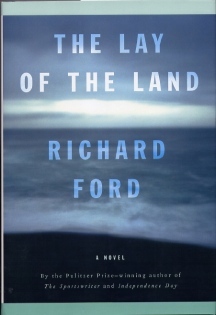The Lay of the Land
 The Lay of the Land is the third novel chronicling Richard Ford's American Everyman, Frank Bascombe. He began Frank's story in The Sportswriter, and then in Independence Day (which I read and reviewed last year). Ford continues the tradition of John Updike and his character, Rabbit Angstrom, in that he drops in on his creation every ten years or so and gets a sense of what it's like to be an American in that time period.
The Lay of the Land is the third novel chronicling Richard Ford's American Everyman, Frank Bascombe. He began Frank's story in The Sportswriter, and then in Independence Day (which I read and reviewed last year). Ford continues the tradition of John Updike and his character, Rabbit Angstrom, in that he drops in on his creation every ten years or so and gets a sense of what it's like to be an American in that time period.The title has a bit of a double meaning. "Land" is what Frank is interested in, as he's a real estate agent, but he's also getting a lay of the land that is his life. He is now 55, and diagnosed with prostrate cancer. His second wife has left him, miraculously reunited with her first husband, who she thought was dead. He has left the leafy suburb of Haddam (which is clearly a fictionalized Princeton--since I live in the area he's writing about, I recognized what locations he was talking about) and lives on Long Beach Island. When we join up with him, it is November 2000. The controversial election is dragging on (Frank voted for Gore and thinks Bush is a numbskull) and it is just before Thanksgiving. We follow Frank through every moment covering three days, including deep into his thoughts. He and his Tibetan co-worker look at some land in western Jersey, then Frank pays a visit to a funeral home for a dead friend, swings by the hospital to have lunch (eating lunch at a hospital cafeteria never occurred to me, but it probably is a good value), but the hospital is a crime scene; he ends up in a bar fight, and visits his ex-wife, who has some startling news. The next day he watches a hotel being imploded, his car window gets smashed, and he ends up in a lesbian bar while the window is fixed. Then, on Thanksgiving Day, everything comes to a head, including dealing with his troublesome son and his new girlfriend, who happens to be missing a hand.
All of this minutiae of everyday life is alternately compelling and at times numbing. Ford is an amazing wordsmith, a chef with metaphors and similes, and describing people and places so vividly that it's easy to imagine oneself right in the room with him. But at times Frank's thoughts become so rattled and self-indulgent that I found myself almost looking ahead so I could see what happens next. Also, the climax of the book is a bit over the top. I was expecting something to go awry on the holiday, but what actually happens was more extreme than I would have thought possible.
Still, The Lay of the Land is a great achievement, especially considering its place in the trilogy. I would hope that like Updike, Ford is up for granting his creation a fourth book.


Nice review, thanks.
ReplyDelete